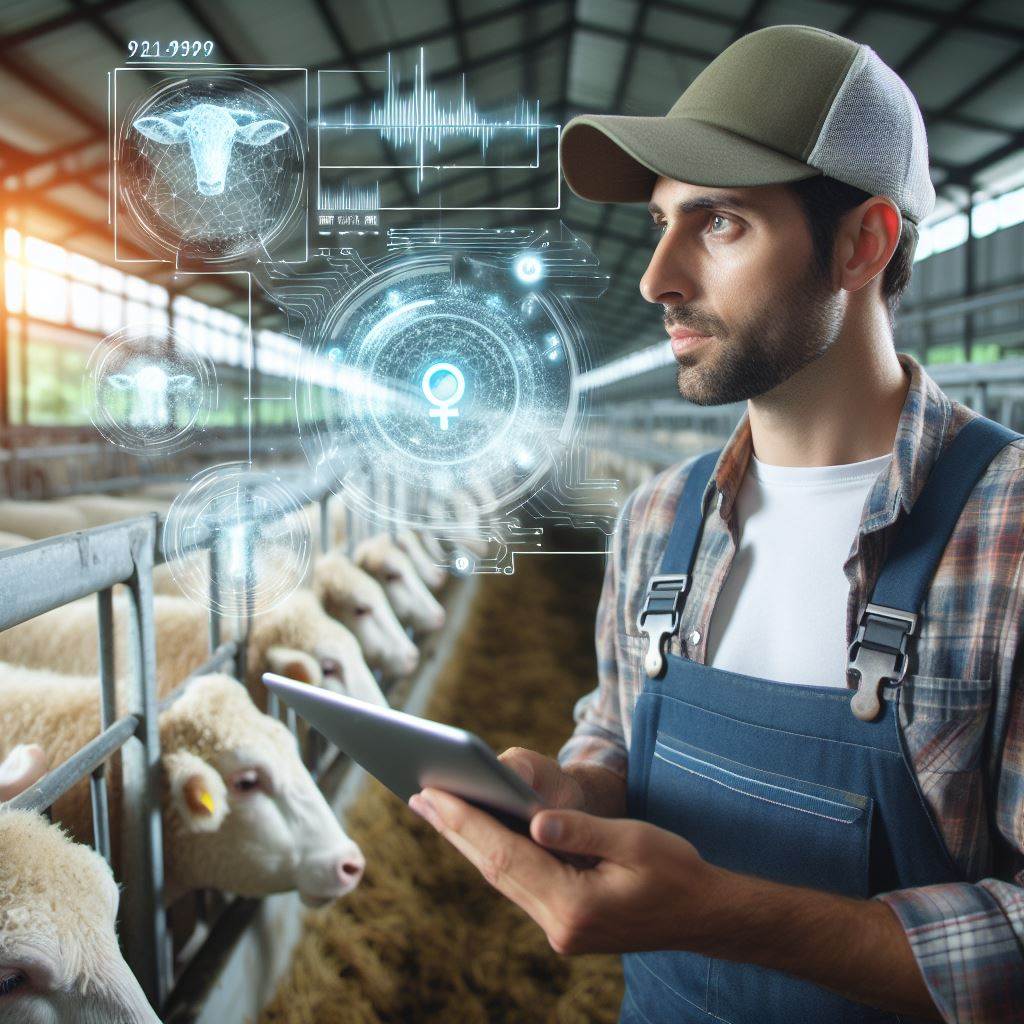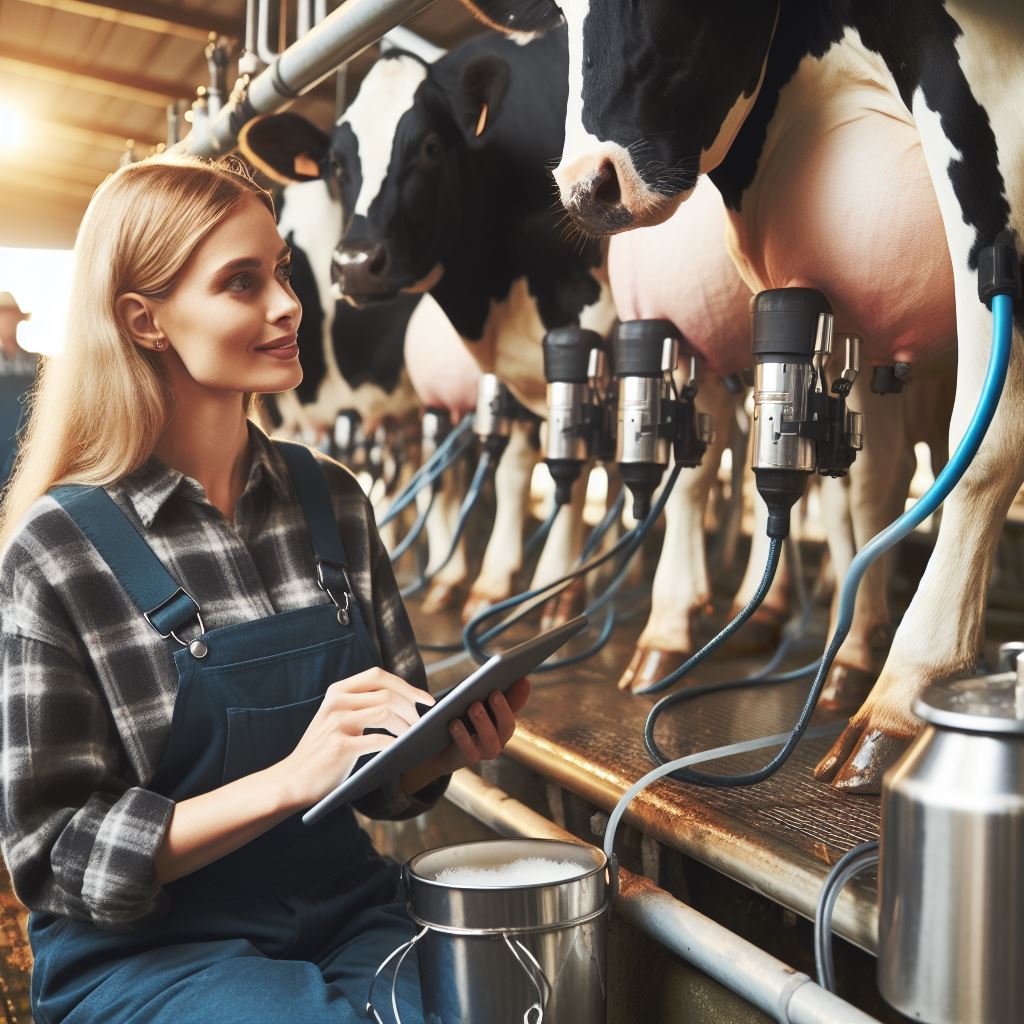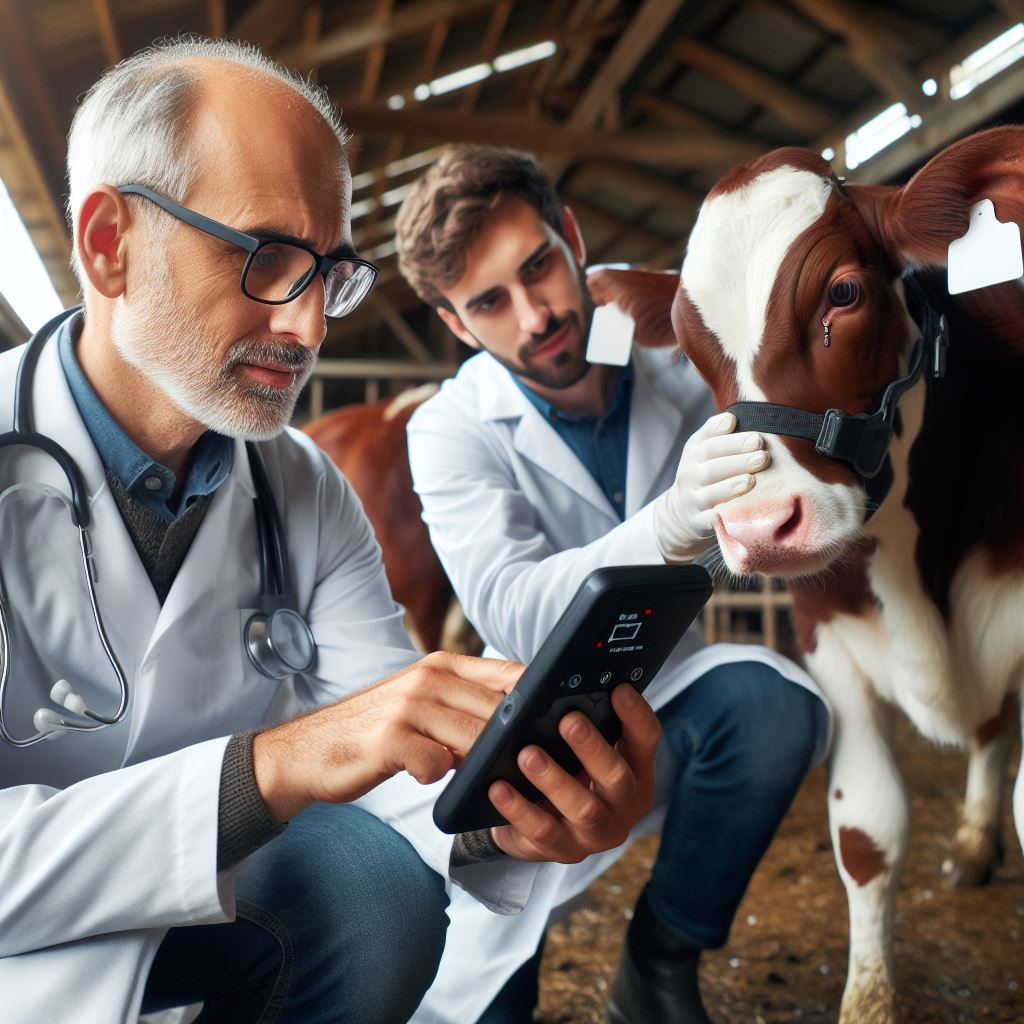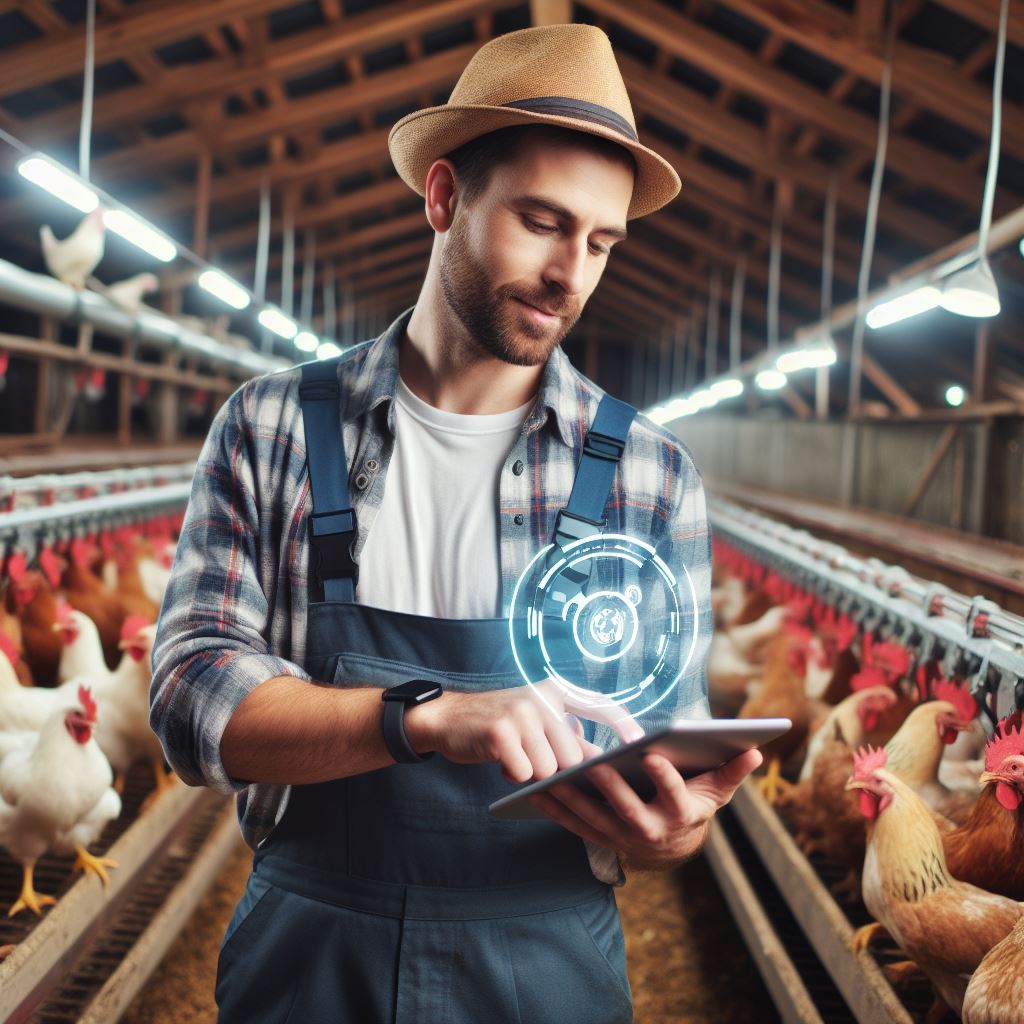Introduction
Brief overview of AI (Artificial Intelligence)
AI is revolutionizing various industries, including farming, by utilizing advanced technology to enhance efficiency and productivity.
However, its potential goes far beyond just economic gains.
AI has the power to significantly improve animal welfare in agriculture.
In the current scenario, farming practices often compromise animal welfare due to various factors such as overcrowding, disease outbreaks, and inadequate monitoring.
But with the advent of AI, these issues can be addressed effectively.
Focus on AI’s potential in enhancing animal welfare
One of the key applications of AI in enhancing animal welfare is through precision livestock farming (PLF).
PLF involves the use of sensors, data analysis, and automation to monitor animal behavior, health, and environmental conditions in real-time.
AI-powered systems can analyze data from sensors attached to animals and their surroundings, providing valuable insights into their needs and well-being.
For example, if a cow is displaying abnormal behavior, an AI system can detect it and alert the farmer to investigate potential issues such as illness or distress.
Furthermore, AI can optimize nutrition plans tailored to individual animals, ensuring they receive the right amount and type of feed.
This not only improves their health but also minimizes waste and environmental impact.
AI can also assist in early disease detection by analyzing patterns in the data collected from animals.
By identifying signs of illness at an early stage, farmers can take preventive measures and provide timely treatment, reducing suffering and losses.
Basically, AI holds great promise in enhancing animal welfare in farming.
With its ability to monitor, analyze, and act upon vast amounts of data, AI can revolutionize farming practices, ensuring the well-being of animals while also improving efficiency and productivity.
Transform Your Agribusiness
Unlock your farm's potential with expert advice tailored to your needs. Get actionable steps that drive real results.
Get StartedCurrent Challenges in Animal Welfare
Existing challenges faced by farmers in managing animal welfare
Farmers face numerous challenges when it comes to managing animal welfare on their farms:
- Ensuring access to clean water, proper nutrition, and appropriate shelter for animals.
- Preventing and controlling diseases within animal populations.
- Maintaining optimal hygiene to minimize the risk of infections and illnesses.
- Implementing suitable handling and transportation practices to avoid stress and injuries.
- Detecting and addressing injuries or illnesses promptly to prevent suffering.
- Providing sufficient space and socializing opportunities for animals to exhibit natural behaviors.
- Managing environmental conditions to avoid excessive heat, cold, or other discomforts.
Importance of addressing these concerns for sustainable farming practices
Addressing the challenges of animal welfare plays a crucial role in ensuring sustainable farming practices:
- Improved animal welfare leads to healthier animals, reducing the need for antibiotics or medical interventions.
- Minimizing stress and discomfort also results in better growth rates and higher quality animal products.
- Enhancing animal welfare aligns with ethical and moral standards, improving public perception of farming practices.
- Ensuring good animal welfare fosters trust between farmers and consumers, enhancing marketability.
- Promoting animal welfare contributes to the long-term sustainability of farming by reducing environmental impacts.
Transition to how AI can play a role in resolving these challenges
Artificial Intelligence (AI) holds immense potential in addressing the challenges of animal welfare:
- AI can analyze large amounts of data to identify patterns and predict potential health issues.
- Through monitoring systems, AI can provide real-time alerts for deviations from normal animal behavior.
- AI-powered tools can automate tasks like feeding, milking, and cleaning, reducing physical strain on farmers.
- Robotic systems equipped with AI can assist in animal handling, minimizing stress and injuries.
- AI can enhance environmental control systems, optimizing temperature, humidity, and ventilation for animal comfort.
- Using AI, farmers can implement precision farming techniques, tailoring care to individual animals’ needs.
- AI-powered cameras and sensors can monitor animal welfare indicators, ensuring proactive care.
Read: Sustainable Grazing: Balancing Land & Livestock
Applications of AI in Animal Welfare
Artificial Intelligence (AI) is revolutionizing various industries, and farming is no exception.
In recent years, AI has found its way into the agricultural sector, playing a significant role in enhancing animal welfare.
Through applications like Precision Livestock Farming (PLF), Automated Feeding Systems, and Environmental Monitoring, AI is transforming animal care and improving overall farming practices.
Precision Livestock Farming (PLF)
Precision Livestock Farming (PLF) is a system that utilizes advanced technologies to monitor and manage livestock.
It involves the use of sensors, cameras, and data analysis to collect valuable information about animal health and behavior.
AI algorithms process this data in real-time to provide insights for farmers.
By incorporating AI, PLF can monitor animal health, detect deviations from normal behavior, and even predict potential diseases.
The continuous monitoring allows early detection and prompt prevention of health issues, ensuring the well-being of animals.
AI-powered PLF systems free farmers from the need for constant manual monitoring, leading to more efficient and effective livestock management.
Automated Feeding Systems
Automated feeding systems are designed to streamline the feeding process for livestock.
These systems not only save time and labor but also play a crucial role in optimizing nutrition and feed management.
With the integration of AI, these systems can provide personalized feeding plans for each animal based on their specific dietary requirements.
AI algorithms analyze various factors like animal weight, age, and health conditions to determine the most suitable nutrition plan.
By automating the feeding process, farmers can ensure regular and accurate feeding, leading to improved animal health and productivity.
The precise control over feeding portions helps prevent overfeeding or underfeeding, enabling animals to reach their full potential.
Environmental Monitoring
The environment plays a vital role in determining animal welfare.
Monitoring key environmental conditions such as temperature, humidity, air quality, and ventilation is crucial for maintaining optimal living conditions for animals.
AI-based solutions offer invaluable assistance in this area.
AI-powered environmental monitoring systems can continuously track and analyze the environmental parameters crucial for animal well-being.
Real-time data collection and analysis enable prompt action if any parameter deviates from the desired range.
Showcase Your Farming Business
Publish your professional farming services profile on our blog for a one-time fee of $200 and reach a dedicated audience of farmers and agribusiness owners.
Publish Your ProfileThis allows farmers to quickly address potential issues and make necessary adjustments to maintain optimal animal living conditions.
In a nutshell, AI applications have proven to be highly beneficial in improving animal welfare in farming.
Precision Livestock Farming (PLF) utilizes AI to monitor animal health and behavior, enabling early detection and prevention of diseases.
Automated feeding systems optimize nutrition and feed management, enhancing animal health and productivity.
Environmental monitoring with AI ensures animals are kept in optimal living conditions.
By embracing AI in farming, we can enhance animal welfare and improve the efficiency and sustainability of the agricultural industry.
Read: Smart Collars: Revolution in Livestock Health
Ethical Considerations and Limitations
Ethical concerns surrounding the use of AI in animal farming
- Animal rights activists raise concerns about the use of AI as it may lead to exploitation.
- There is a fear that AI can replace human contact and compromise the animals’ well-being.
- Opponents argue that using AI may depersonalize farming, reducing the human-animal connection.
- Some question the morality of mass production facilitated by AI, compromising individual animal welfare.
- It is crucial to address these ethical concerns and strike a balance between technology and animal welfare.
- Developing guidelines and regulations to ensure ethical AI implementation is paramount.
Importance of utilizing AI responsibly and transparently
- Responsible utilization of AI in animal farming is essential to maintain ethical standards.
- Farmers must prioritize transparency by openly sharing information about AI systems’ operation.
- Transparency builds trust, allowing consumers to make informed choices about supporting AI-integrated farming.
- By fostering transparency, AI can be a tool that improves animal welfare without compromising consumer confidence.
- Accountability and regular auditing must be established to ensure responsible AI adoption.
Limitations and challenges in implementing AI solutions for animal welfare
- Cost is a significant hurdle in adopting AI systems, making them inaccessible for smaller farms.
- Reliability and accuracy of AI algorithms are crucial for making unbiased welfare decisions.
- Ensuring robust data privacy and security measures is essential when utilizing AI in farming.
- AI systems require continuous monitoring and maintenance to prevent malfunction or misuse.
- Varying farm conditions and animal behaviors pose challenges in developing AI models that cater to individual needs.
- The need for skilled personnel to operate and maintain AI systems may present a limitation for some farms.
Despite these limitations, it is important to remember that AI has the potential to revolutionize animal farming.
By addressing ethical concerns, promoting responsible use, and overcoming challenges, AI can enhance animal welfare while promoting sustainable farming practices.
Read: Livestock Drones: Changing Farming Dynamics

Case Studies and Success Stories
Examples of Farms or Companies Successfully Implementing AI in Animal Welfare Practices
Several farms and companies have embraced AI technology to enhance animal welfare practices.
One such example is Farmsmart, a dairy farm located in the Netherlands.
They implemented AI systems to monitor individual cows’ health, behavior, and reproductive cycle.
Through AI-powered sensors, Farmsmart can identify any deviations from normal patterns and alert the farmers.
This early detection system has significantly reduced the mortality rate among their cattle and improved overall productivity.
Positive Outcomes and Benefits Observed in these Case Studies
The implementation of AI in animal welfare practices has yielded numerous positive outcomes and benefits.
One notable benefit is the ability to detect health issues in animals at an early stage.
AI systems can monitor vital signs and behavior patterns, allowing farmers to promptly intervene and provide necessary treatment.
This proactive approach has resulted in decreased disease prevalence and healthier herds.
Furthermore, AI technology enables precise individualized feeding programs for animals, optimizing nutrition and minimizing waste.
These feeding programs have not only improved animal well-being but also reduced costs for farmers.
Using Success Stories to Inspire and Motivate Adoption of AI Solutions in Farming
The success stories of farms and companies implementing AI in animal welfare practices serve as powerful motivators.
They demonstrate the transformative potential of AI technology in improving animal welfare and farm management.
By showcasing the positive outcomes and benefits, these success stories inspire other farmers to adopt AI solutions.
Increased adoption of AI in farming will contribute to superior animal welfare, increased productivity, and sustainable agriculture.
Moreover, sharing these success stories can foster knowledge exchange and collaboration among farmers and industry experts.
By learning from each other’s experiences, farmers can expedite the adoption process and optimize the use of AI technology.
Read: Sustainable Livestock Farming Technologies
Conclusion
The integration of AI in farming plays a crucial role in enhancing animal welfare.
It offers a wide range of potential benefits and applications, which include precision livestock farming, automated feeding systems, and environmental monitoring.
AI technology enables farmers to monitor and manage livestock more effectively, leading to improved animal welfare.
Precision livestock farming allows for individualized care and early detection of health issues, reducing the risk of diseases and increasing overall well-being.
Automated feeding systems ensure that animals receive the right amount of food, leading to better nutrition and growth.
Furthermore, environmental monitoring with AI helps farmers maintain optimal conditions for their animals, such as temperature, humidity, and air quality.
This contributes to the well-being and productivity of the livestock while minimizing environmental impact.
In light of these potential benefits, it is essential for farmers and industry stakeholders to embrace AI technologies for improved animal welfare and sustainable farming practices.
By adopting AI solutions, we can enhance the quality of life for animals, increase efficiency in farming operations, and promote environmentally friendly practices.
Let us work together to harness the power of AI and ensure a brighter future for both animals and agriculture.



